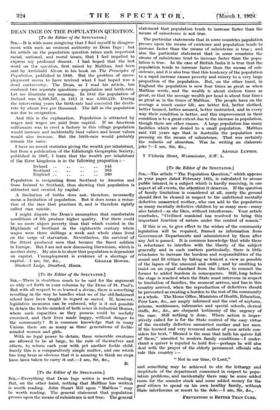DEAN INGE ON THE POPULATION QUESTION.
[To the Editor of the SPECTATOR.] SIR,—It is with some misgiving that I find myself in disagree- ment with such an eminent authority as Dean Inge ; but his article ou the population question raises such important racial, national, and moral issues, that I feel impelled to express my profound dissent. I had hoped that the last word on the question, first raised by Malthus, had been said by Archibald Alison in his book on The Principles of Population, published in 1840. But the problem of unem- ployment seems to have revived what I had hoped was a dead controversy. The Dean, as I read his article, has confused two separate questions—population and birth-rate. Let me illustrate my meaning. In 1841 the population of
Ireland was 8,196,597, in 1911 it was 4,390,219. During the intervening years the birth-rate had exceeded the death- rate by about five per thousand. The fall in the population was due to emigration.
And this is the explanation. Population is attracted by wages and wages are paid from capital. If an American
millionaire was to erect a factory in this village population would increase and incidentally land values and house values would also increase. But the birth-rate would probably remain the same.
I have no recent statistics giving the wealth per inhabitant, but from a publication of the Edinburgh Geographic Society, published in 1907, I learn that the wealth per inhabitant of the three kingdoms is in the following proportion ;- Ireland .. 145
Scotland ... .. 265 England 380 Population is emigrating from Scotland to America and from Ireland to Scotland, thus showing that population is attracted and created by capital.
A limitation of births does not, therefore, necessarily mean a limitation of population. But it does mean a reduc- tion of the race that practises it, and is therefore rightly called race suicide.
I might dispute the Dean's assumption that comfortable conditions of life produce higher quality. For .there could be no more abject poverty than that which existed in the Highlands of Scotland in the eighteenth century where wages were three shillings a week and whole clans lived on the verge of starvation. Nevertheless, the survival of the fittest produced men that became the finest soldiers in Europe. But I am not now discussing Darwinism, which is another story. My aim is to show that population is dependent on capital. Unemployment is evidence of a shortage of
capital.—I am, Sir, &c., GRAHAM BOWER, Studwell Lodge, Drozford, Hants.










































 Previous page
Previous page